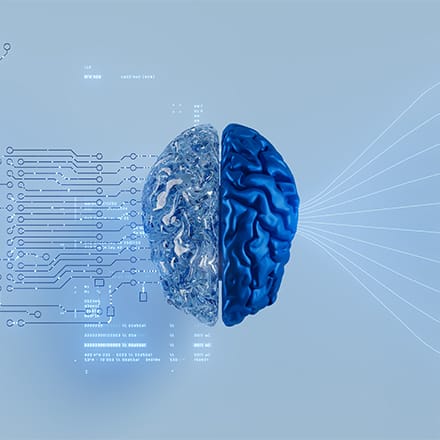The Future of AI: Careers in Machine Learning

Understanding the numbers
When reviewing job growth and salary information, it’s important to remember that actual numbers can vary due to many different factors—like years of experience in the role, industry of employment, geographic location, worker skill and economic conditions. Cited projections are based on Bureau of Labor Statistics data, not on SNHU graduate outcomes, and do not guarantee actual salary or job growth.
Human history has a long and favorable track record of technological advancements, particularly when it comes to ideas that seem ludicrous at the time. Even as recently as the 1980s, there was no internet in people’s homes. The very means by which you are reading this article did not exist. Online school did not exist, at least not in the way we take college classes online now.
And while each technological advancement may have its detractors, it’s hard to argue with the benefits of technology as a whole. After all, thinking big got us to the moon, and gave us television, 3-D printing and a host of incredible advances in modern medicine.
Are you wondering what’s next? To many, the future of technology lies squarely with machine learning and with artificial intelligence, known as AI.
So, What is Artificial Intelligence?
Artificial intelligence refers to technologies that can perform complex tasks that usually require reasoning, creating and decision-making by human beings, according to the National Aeronautics and Space Administration (NASA).
When, for example, a company like Netflix wants to predict what movies a customer might want to watch next, a data scientist will create an algorithm based on that customer’s viewing history. Then, they'll use that algorithm to offer a list of suggestions.
Learn more about what artificial intelligence is.
What is the Difference Between AI and Machine Learning?
While machine learning is useful, it’s important to note that there is no artificial intelligence involved in its functions. Machine learning (ML) involves rote mathematical or mechanical processes only. Artificial intelligence then advances data science and machine learning even further.

“(Machine learning uses) data science programs that can adapt based on experience,” said Ben Tasker, an adjunct faculty member and a skills coach for SNHU's professional skills course, "Generative AI: Concept to Innovation." “Take a weather predictor, for example. The more weather inputs there are, the better the prediction for what will come next.”
Whereas machine learning can make predictions, he said artificial intelligence can make adjustments to its computations. In other words, “AI can dynamically adapt its behavior based on input, unlike static ML models” Tasker said. For example, a fully autonomous, self-driving car is an example of something that would use full artificial intelligence.
How Will AI Be Used in the Future?
We have actually been using AI for some time, and not just in factories and on assembly lines or to design futuristic cars. "AI isn’t just knocking on the door of the future," Tasker said. "It’s already moved in."
Chatbots and virtual assistants are being routinely used to respond to emails, schedule appointments and take meeting notes. And that's not all. Tasker said AI is gaining ground in classrooms, hospitals, courtrooms and boardrooms. Now that the technology has established itself across industries, he said a new era of AI is on the horizon.
"The next evolution of AI won’t just be about efficiency," said Tasker. "It will be about amplification."

AI agents are one of the biggest advancements on the horizon, according to Mae Mullen, an organic marketing and AI strategist at SNHU. Mullen has been working with AI and large language models (LLMs) for six years, including four years of professional experience.
"Rather than acting as answer engines, agents will be able to autonomously handle initiating follow-up tasks, making decisions and collaborating with other AI systems," she said.
Will AI Take Your Job?
For some jobs or tasks, quite possibly. For all jobs or tasks? Not likely.
Mullen noted that positions at the most risk of replacement include customer service, administrative work and recruitment. "Though I would argue that LLMs are not suitable for fully replacing a human job due to bias and hallucination, the reality is that many companies are willing to accept these risks to cut operation costs," she said.
For other positions, instead of taking your job, she said AI could change the way you work and improve your productivity.
"Though there is a sense that all repetitive tasks will be outsourced to AI eventually," Mullen said. "The reality is that most efficiency gains from AI are coming from individual workers’ use of AI rather than a company-wide revolution."
Tasker agreed. "AI has the potential to supercharge human capacity, making it easier for people to focus on the parts of their work that require creativity, empathy or judgment," he said.
Although some roles might disappear as the technology gets its legs, AI is creating new jobs, too, according to Tasker.
Learn more about the future of work and the role of AI in the workplace.
Find Your Program
What Are Some Careers in Machine Learning and AI?
Because so much about the field of data science in general and AI in particular is new, there are many opportunities to make your own niche. “Especially now that many companies have started to invest in the idea of artificial intelligence,” Tasker said.
Careers for computer information and research scientists are predicted to grow 26% between now and 2033, according to the U.S. Bureau of Labor Statistics (BLS). That is much faster than the national average for career growth. The median pay was $140,910 in 2024, the BLS reports.*
Tasker and Mullen said that some other top career options for machine learning and artificial intelligence include:
- AI engineer: In this role, you may be involved in the different facets of designing, developing and building artificial intelligence models and training them to learn from experience, according to the United States Artificial Intelligence Institute (USAII).
- AI ethicist: "Work directly with companies to ensure that AI systems are designed and implemented while addressing concerns such as bias and transparency," Mullen said.
- Data scientist: In this role, you might use data, computer modeling and statistics to solve problems, according to the BLS. Mullen said data scientists are highly sought after in the field for their skill sets.
- Big data engineer: Overlapping with the role of a data scientist, as a big data engineer, you could design, build and optimize complex systems of "big data" or extremely large datasets, the Data Science Council of America (DSCA) said. This is another highly-sought after role, according to Mullen.
- Machine learning engineer: This role is similar to that of an AI engineer, focusing instead on machine learning.
Careers in machine learning and artificial intelligence are still being defined, which creates generous opportunities to innovate and carve your own career path. New AI-related roles are emerging that didn’t even exist five years ago, according to Tasker, like prompt engineer and AI coach.
"These roles sit at the intersection of tech and humanity, helping organizations navigate complexity with both speed and care," Tasker said.
What Skills Are Needed for a Career in AI?
![]() The more math, programming, and experience with cloud computing that you can get under your belt, the better.
The more math, programming, and experience with cloud computing that you can get under your belt, the better.
"Learn Python," Mullen said. "Having a strong foundation in that programming language will allow you not only to understand how AI systems process data but also allow you to create your own AI applications more easily."
Keep in mind that while a bachelor’s degree is a great foundation on which to build a career in artificial intelligence, an advanced degree like a master's in computer science might be necessary depending on the type of role you plan to pursue.
“While advanced degrees are common for technical AI roles, applied AI positions increasingly value skills, certifications, and hands-on experience,” said Tasker.
Why is AI Controversial?
According to both Tasker and Mullen, concerns about the impact of AI aren't overblown. If you're interested in AI, that means you need to take ethics seriously to ensure your work is having a positive impact.
In addition to concerns about job displacement, here are some of the major reasons AI remains controversial:
- Bias and misinformation: "AI technology is incapable of fully ridding itself of the bias of the culture who created it, which can cause it to recreate real-world discrimination without careful oversight," Mullen said.
She noted that just this year, Chris Gatlin was released after spending 17 months in jail for a crime he didn't commit. "He was falsely identified by an AI facial recognition program that is still in use by law enforcement agencies across the country," Mullen said.
Not only can AI offer biased or false information, it can also be used to intentionally create and spread misinformation, the National Library of Medicine (NLM) reports. There's concern about AI-generated deepfakes, too, which the NLM said pose unprecedented challenges to information and media literacy.
- Data training ethics: Many large language models were trained on data — like art, photography and writing — without the original creator or copyright holder's permission. This has led to many major lawsuits about fair use, many of which are still unresolved, according to WIRED.
- Diminished cognitive capacities: Relying too much on AI can affect your confidence and critical-thinking skills, according to a study by researchers at Microsoft and Carnegie Mellon (PDF source).
"Used improperly, technologies can and do result in the deterioration of cognitive faculties that ought to be preserved," the study said.
- Environmental impacts: The widespread use of AI comes with environmental consequences, according to MIT News, including increased use of electricity and water consumption as well as a large carbon footprint.
"Bias, surveillance and job displacement aren’t just headlines — they’re design challenges," Tasker said. "The way forward requires responsible implementation, continuous learning and an intentional focus on equity."
Mullen said certain forms of AI have greater potential for harm than others, like AI-generated video and audio. "It is already being used to spread misinformation, facilitate scams, reinforce bias and devalue the work of human artists at a massive scale," she said.
Still, these tools aren't going away any time soon, Mullen said, and educating yourself is the best way to combat misuse.
By studying AI, you can work toward finding solutions to these issues and building a world wherein AI does what it has the potential to do: "Offloading the repetitive and surfacing what’s most human," Tasker said.
A degree can change your life. Find the SNHU technology program that can best help you meet your goals.
*Cited job growth projections may not reflect local and/or short-term economic or job conditions and do not guarantee actual job growth. Actual salaries and/or earning potential may be the result of a combination of factors including, but not limited to: years of experience, industry of employment, geographic location, and worker skill.
A former higher education administrator, Dr. Marie Morganelli is a career educator and writer. She has taught and tutored composition, literature, and writing at all levels from middle school through graduate school. With two graduate degrees in English language and literature, her focus — whether teaching or writing — is in helping to raise the voices of others through the power of storytelling. Connect with her on LinkedIn.
Explore more content like this article

How to Get Into AI: What AI at Work Looks Like for Beginners

Understanding AI Ethics: Issues, Principles and Practices

What is the Best Degree for an Artificial Intelligence Career?
About Southern New Hampshire University

SNHU is a nonprofit, accredited university with a mission to make high-quality education more accessible and affordable for everyone.
Founded in 1932, and online since 1995, we’ve helped countless students reach their goals with flexible, career-focused programs. Our 300-acre campus in Manchester, NH is home to over 3,000 students, and we serve over 135,000 students online. Visit our about SNHU page to learn more about our mission, accreditations, leadership team, national recognitions and awards.


